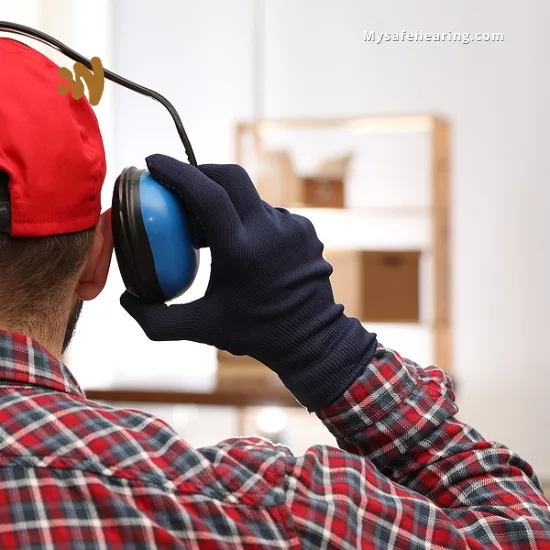
There is no definitive answer to this question. Some say wearing hearing protection when vacuuming is unnecessary, as the noise level is not very high. Others recommend wearing earplugs or headphones to reduce the risk of hearing damage.
The truth is that vacuuming can be a noisy activity, and it is important to take steps to protect your ears. The sound level produced by a vacuum cleaner can reach up to 85 decibels (dB), equivalent to a lawn mower’s sound.
Prolonged exposure to sounds at this level can cause permanent damage to your hearing. If you choose to wear hearing protection while vacuuming, ensure it is comfortable and fits well.
Does Vacuuming Damage Hearing?
It is important to protect your ears when vacuuming, as the noise level produced by a vacuum cleaner can reach up to 85 decibels (dB), equivalent to the sound of a lawn mower. Prolonged exposure to sounds at this level can cause permanent damage to your hearing.
What Type Of Hearing Protection Should I Wear?
Some good options include earplugs or headphones.
Earplugs are small foam plugs that fit snugly into your ears. They are a good option if you are looking for moderate noise reduction.
Headphones are a better choice if you need maximum noise reduction. They fit over your ears and cover them completely. This type of hearing protection can be uncomfortable to wear for long periods, but it effectively blocks noise.
Should I Wear Headphones Or Earplugs When Vacuuming?
The answer to this question depends on your needs. If you want moderate noise reduction, earplugs are a good option. If you need maximum noise reduction, headphones are a better choice. However, remember that headphones can be uncomfortable to wear for long periods.
How Long Should I Wear Hearing Protection?
If you choose to wear hearing protection while vacuuming, wear it for the entire time you are vacuuming. It is also a good idea to take breaks occasionally to give your ears a chance to rest.
Can I Still Vacuum If I Have a Hearing Loss?
If you have hearing loss, you may still be able to vacuum, but you must use a quieter model. Many low-noise vacuums on the market are perfect for people with hearing problems. Talk to your audiologist or doctor about which vacuum is right for you.
Is Vacuuming The Only Thing That Can Damage My Hearing?
No, many activities can damage your hearing. Some other common causes of hearing loss include exposure to loud music, working in a noisy environment, and ageing.
Is 82 dB Loud For A Vacuum Cleaner?
Yes, the sound level of a vacuum cleaner can reach up to 85 dB, which is equivalent to the sound of a lawn mower. Prolonged exposure to sounds at this level can cause permanent damage to your hearing.
How Long Can I Be Exposed To 82 dB?
You can be exposed to 82 dB for up to 8 hours without experiencing any damage to your hearing. However, it is important to remember that this is only an estimate, and you may experience damage sooner depending on your individual sensitivity to noise.
How Loud Is A Dyson?
The sound level of a Dyson vacuum cleaner can reach up to 90 dB, which is equivalent to the sound of a chainsaw.
How Loud Are Shark Vacuums?
The sound level of a Shark vacuum cleaner can reach up to 85 dB, which is equivalent to the sound of a lawn mower.
How Loud Is The Roomba?
The sound level of the Roomba vacuum cleaner can reach up to 70 dB, which is equivalent to the sound of a garbage disposal.
What Are Some Low Noise Vacuums?
Some good low-noise vacuums include the Shark Navigator Freestyle Vacuum, the Dyson V8 Animal Cordless Vacuum, and the Roomba 690 Robot Vacuum. All of these vacuums have a sound level of less than 80 dB.
What Is The Most Quiet Vacuum?
The quietest vacuum is the Roomba 890 Robot Vacuum. It has a sound level of only 50 dB, which is equivalent to the sound of a refrigerator.
Can I Vacuum If I Have An Ear Infection?
No, it is not recommended to vacuum if you have an ear infection. Vacuuming can cause the infection to worsen and may even lead to hearing loss.
Some Tips For Protecting Your Hearing While Vacuuming
Make sure the hearing protection is comfortable and fits well. You should also wear it the entire time you are vacuuming and take breaks every so often to give your ears a chance to rest.
Also, use a quieter vacuum cleaner if you have hearing loss. Many low-noise vacuums on the market are perfect for people with hearing problems. Talk to your audiologist or doctor about which vacuum is right for you.
Finally, if you are experiencing any symptoms of hearing loss, such as ringing in the ears, buzzing, or muffled sounds, see a hearing specialist as soon as possible. Early diagnosis and treatment of hearing loss are key to preventing further damage.
Conclusion
Many things can cause damage to your hearing, and vacuuming is just one of them. Exposure to loud music, working in a loud environment, and ageing are all common causes of hearing loss.
If you experience any symptoms of hearing loss, it is important to see a hearing specialist as soon as possible. Early diagnosis and treatment of hearing loss are key to preventing further damage.